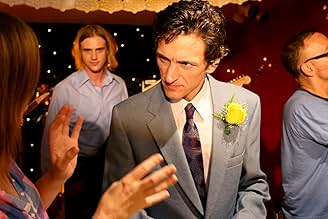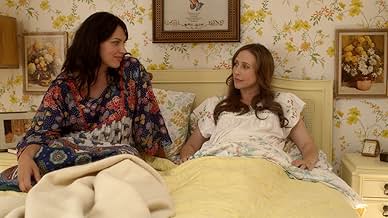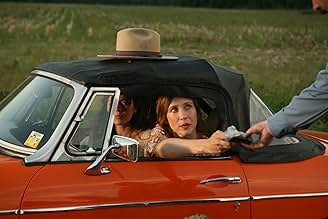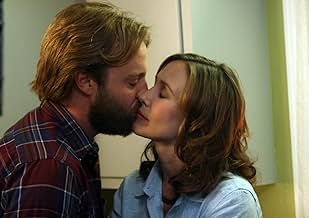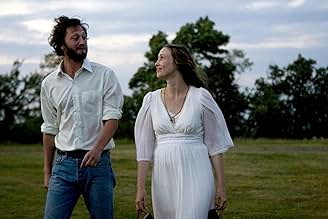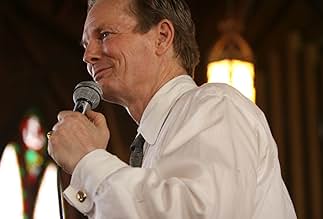IMDb-BEWERTUNG
6,2/10
3357
IHRE BEWERTUNG
Füge eine Handlung in deiner Sprache hinzuA chronicle of one woman's lifelong struggle with her faith.A chronicle of one woman's lifelong struggle with her faith.A chronicle of one woman's lifelong struggle with her faith.
- Auszeichnungen
- 1 Gewinn & 7 Nominierungen insgesamt
Empfohlene Bewertungen
Higher ground is one the finest films on its subject ever made, as well as one of the best films this year. Surprisingly, it's the directorial debut of one of our finest actors, Vera Farmiga. She's been very good in every film in which she's played any role, but is probably best known for her Oscar nominated turn in Jason Reitman's Up in the Air, opposite George Clooney. But for her own film, Farmiga has chosen a very difficult subject – one woman's struggle with her faith; her tenuous relationship with her husband inside a strictly defined religious community; and most important, her personal relationship with God.
The story covers the three-decade spiritual journey (late '50s through '70s) of Corinne, played as a little girl by McKensie Turner, as a teenager by Farmiga's younger sister, Taissa, and as a grown woman by Farmiga herself, in a performance that is brave, nuanced, and emotionally powerful. Hollywood films on this subject can either preach to the choir or have a contemptuous agenda, but Farmiga's film isn't about whether this or that religion is good or bad. It's about faith, and doubt, and finding one's way in life. In fact, this is the best work on the subject since Meryl Streep dazzled us in "Doubt." Here's how it goes: As a little girl, Corinne's pastor shows her how to invite Jesus into her heart, an idea that appeals to her since her home life is marred by a drunken father (John Hawkes) and a mother who has eyes for other men (Donna Murphy). But Corinne doesn't quite know what she's supposed to feel. She does like animals, and she also gives an accordion a try, when a door-to-door salesman pitches one to the family. Corinne's mother says, "She's not musical," to which the salesman quickly replies, "Maybe she hasn't found her instrument yet." This foreshadows Corrine's struggle to find her path to God.
Corinne is intellectually curious and has a talent for writing, and when a young guitarist asks her to write a song with him, she finds herself doing what so many teenagers have done before, and then pregnancy and a wedding follow. Corinne must then put her dreams of a writing career on hold, as she cares for the baby while her husband plays in a rock band. But a near tragic experience convinces them they need to give up this reckless life and join an evangelical Christian church. Corinne wants very badly to feel the Spirit, and to be happy with her husband in this religious community, but she doesn't feel what her pastor preaches, nor what she sees other members feeling. This is both a puzzlement and a torment to her, especially when she makes a good friend, Annika, played wonderfully by Dagmara Dominczyk, to whom loving and feeling God come easily.
This particular Christian community will be one many people recognize; they adhere to the bible's word and are happy to follow a strict patriarchal discipline. As a director, Farmiga does not judge, but those who do not subscribe to this type of religious practice may, and that would be a mistake. These are not bad people, they have chosen a life that works for them; it just may not be a good fit for Corinne. She's smart, studies the bible along with many other books, and she feels she has something valuable to share with the congregation. But when she speaks up, she's admonished by the pastor's wife for "coming very close to preaching and attempting to teach the men." She chafes under this restraint, which seems unreasonable to her. And then a second, very real, tragedy strikes, turning her struggle into a spiritual crisis. I think many people will recognize precisely this experience from their own lives: it is very real.
Farmiga's film does not hurry, the story unfolds slowly, and it also contains a fair amount of humor. I could've died laughing during a scene in which Corinne's marriage counselor tells her about "a dire MacMuffin moment," but it was no laughing matter. There are also many small everyday family scenes that may not seem of much consequence, but every piece of the story is important, so watch and listen carefully, as everything builds to one of the most emotionally powerful endings of any film this year. At the climax, Corinne speaks to the congregation, from her heart, a heart that perhaps gives too much, and also with a mind trying very hard to make sense of what it means to walk "The Higher Ground." In the end, we get a sense that Corinne will find her instrument, and that she will go on to make music with God.
Higher Ground is an excellent film and a brilliant directorial debut by Vera Farmiga, from whom I think we can expect great things in the future. I highly recommend it to all who appreciate literary quality stories that deal honestly with human feelings and relationships.
The story covers the three-decade spiritual journey (late '50s through '70s) of Corinne, played as a little girl by McKensie Turner, as a teenager by Farmiga's younger sister, Taissa, and as a grown woman by Farmiga herself, in a performance that is brave, nuanced, and emotionally powerful. Hollywood films on this subject can either preach to the choir or have a contemptuous agenda, but Farmiga's film isn't about whether this or that religion is good or bad. It's about faith, and doubt, and finding one's way in life. In fact, this is the best work on the subject since Meryl Streep dazzled us in "Doubt." Here's how it goes: As a little girl, Corinne's pastor shows her how to invite Jesus into her heart, an idea that appeals to her since her home life is marred by a drunken father (John Hawkes) and a mother who has eyes for other men (Donna Murphy). But Corinne doesn't quite know what she's supposed to feel. She does like animals, and she also gives an accordion a try, when a door-to-door salesman pitches one to the family. Corinne's mother says, "She's not musical," to which the salesman quickly replies, "Maybe she hasn't found her instrument yet." This foreshadows Corrine's struggle to find her path to God.
Corinne is intellectually curious and has a talent for writing, and when a young guitarist asks her to write a song with him, she finds herself doing what so many teenagers have done before, and then pregnancy and a wedding follow. Corinne must then put her dreams of a writing career on hold, as she cares for the baby while her husband plays in a rock band. But a near tragic experience convinces them they need to give up this reckless life and join an evangelical Christian church. Corinne wants very badly to feel the Spirit, and to be happy with her husband in this religious community, but she doesn't feel what her pastor preaches, nor what she sees other members feeling. This is both a puzzlement and a torment to her, especially when she makes a good friend, Annika, played wonderfully by Dagmara Dominczyk, to whom loving and feeling God come easily.
This particular Christian community will be one many people recognize; they adhere to the bible's word and are happy to follow a strict patriarchal discipline. As a director, Farmiga does not judge, but those who do not subscribe to this type of religious practice may, and that would be a mistake. These are not bad people, they have chosen a life that works for them; it just may not be a good fit for Corinne. She's smart, studies the bible along with many other books, and she feels she has something valuable to share with the congregation. But when she speaks up, she's admonished by the pastor's wife for "coming very close to preaching and attempting to teach the men." She chafes under this restraint, which seems unreasonable to her. And then a second, very real, tragedy strikes, turning her struggle into a spiritual crisis. I think many people will recognize precisely this experience from their own lives: it is very real.
Farmiga's film does not hurry, the story unfolds slowly, and it also contains a fair amount of humor. I could've died laughing during a scene in which Corinne's marriage counselor tells her about "a dire MacMuffin moment," but it was no laughing matter. There are also many small everyday family scenes that may not seem of much consequence, but every piece of the story is important, so watch and listen carefully, as everything builds to one of the most emotionally powerful endings of any film this year. At the climax, Corinne speaks to the congregation, from her heart, a heart that perhaps gives too much, and also with a mind trying very hard to make sense of what it means to walk "The Higher Ground." In the end, we get a sense that Corinne will find her instrument, and that she will go on to make music with God.
Higher Ground is an excellent film and a brilliant directorial debut by Vera Farmiga, from whom I think we can expect great things in the future. I highly recommend it to all who appreciate literary quality stories that deal honestly with human feelings and relationships.
Higher Ground is a beautiful and stirring tale based on a personal memoir about a woman who, after growing up in a Christian church, starts asking questions about what she's been taught. She delicately steps around the admonition not to preach to men, quietly disobeys the order against exploring her spirituality, and finally, at a turning point, learns that it is OK to be sad and angry at God, that she does not have to sing "It Is Well With My Soul" when it honestly isn't.
Though the film's critique of the church is firm and sharp in many places, its observations are fair, loving, and certainly earned. Besides being a thoroughly enjoyable film to watch, Higher Ground is an excellent starting point for dialog. Those who are other than Christian, even perhaps those who dislike Christians, may be able to put voice to their concerns in a new way, and can maybe be led to see that most Christians are honestly just trying to be the best they can be. Christians can take the critique as a mirror to hold up to their own congregations, looking for areas where perhaps they are inadvertently hurting others or themselves. To those inside the church, I would suggest that this film is a God-given opportunity to examine yourselves, to open your eyes enough to realize that the church is not infallible, and perhaps take the prompting to apologize for areas in which you and the church have failed to represent Christ accurately.
Religious or not, whether you seek dialog or just pure entertainment, Higher Ground is an excellent choice. It is worth every minute, a fun way of looking at a serious topic, and it will always stand out in my mind as an exceptional piece of art.
Though the film's critique of the church is firm and sharp in many places, its observations are fair, loving, and certainly earned. Besides being a thoroughly enjoyable film to watch, Higher Ground is an excellent starting point for dialog. Those who are other than Christian, even perhaps those who dislike Christians, may be able to put voice to their concerns in a new way, and can maybe be led to see that most Christians are honestly just trying to be the best they can be. Christians can take the critique as a mirror to hold up to their own congregations, looking for areas where perhaps they are inadvertently hurting others or themselves. To those inside the church, I would suggest that this film is a God-given opportunity to examine yourselves, to open your eyes enough to realize that the church is not infallible, and perhaps take the prompting to apologize for areas in which you and the church have failed to represent Christ accurately.
Religious or not, whether you seek dialog or just pure entertainment, Higher Ground is an excellent choice. It is worth every minute, a fun way of looking at a serious topic, and it will always stand out in my mind as an exceptional piece of art.
With the proliferation of faith-based movies currently in theaters now ("Miracles from Heaven", "God's Not Dead 2", "The Young Messiah" among others) I thought it would be interesting to review one among the genre from 2011, "Higher Ground".
As a Christian, "Higher Ground" is kind of a tough call for me. While I identified with Corrine (Vera Farmiga in an ambitiously impressive directorial debut, as well) in her lifelong search for faith, both in God and in herself, I came away from this film conflicted.
We see Corrine being indoctrinated into a church cult while still an innocent young girl in the 1960's. We then watch as her extraordinary life unfolds before us, both personally and religiously, through the tumult and the joy, spanning the spirit-searching decade of the 1970's and on into the '80's. We bear witness as she transforms from the subservient female role commanded of her by the cult, to an emancipated and independent single mother immersed in a quest for self-discovery. As we do so, I couldn't help but feel that Corrine's road toward her own personal "higher ground", while undoubtedly still rigorous and fraught with challenge, would likely have been one of less disillusionment, discouragement and frustration had it not been born and nurtured of such distorted doctrine.
The sexual themes in "Higher Ground", which are quite frank and explicit, come off as blatantly prurient and inserted primarily for commercial appeal. These scenes register as out of place and really unnecessary to the telling of the story.
This film is clearly a labor of love and devotion for the ultra-talented Farmiga. Her role as Corrine is an exceptionally difficult one to deliver on with credibility and impact. Farmiga more than meets demand with her multi-layered and affecting performance. Her character's testimonial as the movie ends is at once moving, heart wrenching and hopeful. The words pour out from the depths of her soul. And they make it clear that Corrine's journey to reach "higher ground", while it sustains as a driving and passionate yearning, is just beginning.
As a Christian, "Higher Ground" is kind of a tough call for me. While I identified with Corrine (Vera Farmiga in an ambitiously impressive directorial debut, as well) in her lifelong search for faith, both in God and in herself, I came away from this film conflicted.
We see Corrine being indoctrinated into a church cult while still an innocent young girl in the 1960's. We then watch as her extraordinary life unfolds before us, both personally and religiously, through the tumult and the joy, spanning the spirit-searching decade of the 1970's and on into the '80's. We bear witness as she transforms from the subservient female role commanded of her by the cult, to an emancipated and independent single mother immersed in a quest for self-discovery. As we do so, I couldn't help but feel that Corrine's road toward her own personal "higher ground", while undoubtedly still rigorous and fraught with challenge, would likely have been one of less disillusionment, discouragement and frustration had it not been born and nurtured of such distorted doctrine.
The sexual themes in "Higher Ground", which are quite frank and explicit, come off as blatantly prurient and inserted primarily for commercial appeal. These scenes register as out of place and really unnecessary to the telling of the story.
This film is clearly a labor of love and devotion for the ultra-talented Farmiga. Her role as Corrine is an exceptionally difficult one to deliver on with credibility and impact. Farmiga more than meets demand with her multi-layered and affecting performance. Her character's testimonial as the movie ends is at once moving, heart wrenching and hopeful. The words pour out from the depths of her soul. And they make it clear that Corrine's journey to reach "higher ground", while it sustains as a driving and passionate yearning, is just beginning.
Congratulations to Ms. Farmiga on such an excellent debut as a director.
As a completely involved in church evangelical Christian, it was exciting to see major elements of my lifestyle portrayed accurately on screen for a change. This film takes a kind and thoughtful middle road, not portraying the Christian life at extremes as it so often is- both negatively in many mainstream films and over the top positive in Christian films.
I wish I could send an email to all my church friends telling them to go see this film. But, as the film intimates, there are social and cultural taboos present within Christian churches. Some of the dialog and a few of the images would be so offensive to a small minority of my Christian friends that I would not dare to broadcast a recommendation but rather discreetly recommend it to those who would not be offended.
And a sizable segment of the really committed Christian population does not attend (at least in public) any R rated movie. This movie looks like it could have easily been brought to the screen as a PG-13 and reached a much wider audience.
And I hope this can reach as wide an audience as possible both for its portrayal of the Christian lifestyle and so we get to see more films from Vera Farmiga.
As a completely involved in church evangelical Christian, it was exciting to see major elements of my lifestyle portrayed accurately on screen for a change. This film takes a kind and thoughtful middle road, not portraying the Christian life at extremes as it so often is- both negatively in many mainstream films and over the top positive in Christian films.
I wish I could send an email to all my church friends telling them to go see this film. But, as the film intimates, there are social and cultural taboos present within Christian churches. Some of the dialog and a few of the images would be so offensive to a small minority of my Christian friends that I would not dare to broadcast a recommendation but rather discreetly recommend it to those who would not be offended.
And a sizable segment of the really committed Christian population does not attend (at least in public) any R rated movie. This movie looks like it could have easily been brought to the screen as a PG-13 and reached a much wider audience.
And I hope this can reach as wide an audience as possible both for its portrayal of the Christian lifestyle and so we get to see more films from Vera Farmiga.
Higher Ground is a story about an honest search for faith in a fearful, posturing world. It is an unpretentious film. It is also Vera Farmiga's directorial debut and it showcases her signature style. She displays astonishing depths, carrying roles with integrity and intelligence. I've always noted that she has an atypical screen glamor that grows in its unfurling. In fact, it's a special beauty but it fits a needed niche. If you have ever walked the path of faith, honestly questing, be prepared for a cathartic, ambiguous denouement that may take you to higher ground. I enthusiastically recommend this soft, sad but lovely journey by cinema.
Wusstest du schon
- WissenswertesVera Farmiga directed this film while five months pregnant.
- PatzerVera Farmiga has blue eyes. Taissa Farmiga, the younger sister of Vera who plays the younger version of her in the movie, has brown eyes.
- VerbindungenFeatured in Maltin on Movies: Haywire (2012)
- SoundtracksBlessed Assurance
Written by Fanny Crosby and Phoebe Knapp
Arranged by Warren Haynes
Performed by Warren Haynes, Amy Helm, Molly Hawkey and MacHan Taylor
Top-Auswahl
Melde dich zum Bewerten an und greife auf die Watchlist für personalisierte Empfehlungen zu.
- How long is Higher Ground?Powered by Alexa
Details
- Erscheinungsdatum
- Herkunftsland
- Offizieller Standort
- Sprache
- Auch bekannt als
- Higher Ground
- Drehorte
- Produktionsfirmen
- Weitere beteiligte Unternehmen bei IMDbPro anzeigen
Box Office
- Budget
- 2.000.000 $ (geschätzt)
- Bruttoertrag in den USA und Kanada
- 841.733 $
- Eröffnungswochenende in den USA und in Kanada
- 21.495 $
- 28. Aug. 2011
- Weltweiter Bruttoertrag
- 1.043.262 $
- Laufzeit1 Stunde 49 Minuten
- Farbe
- Sound-Mix
- Seitenverhältnis
- 1.85 : 1
Zu dieser Seite beitragen
Bearbeitung vorschlagen oder fehlenden Inhalt hinzufügen







